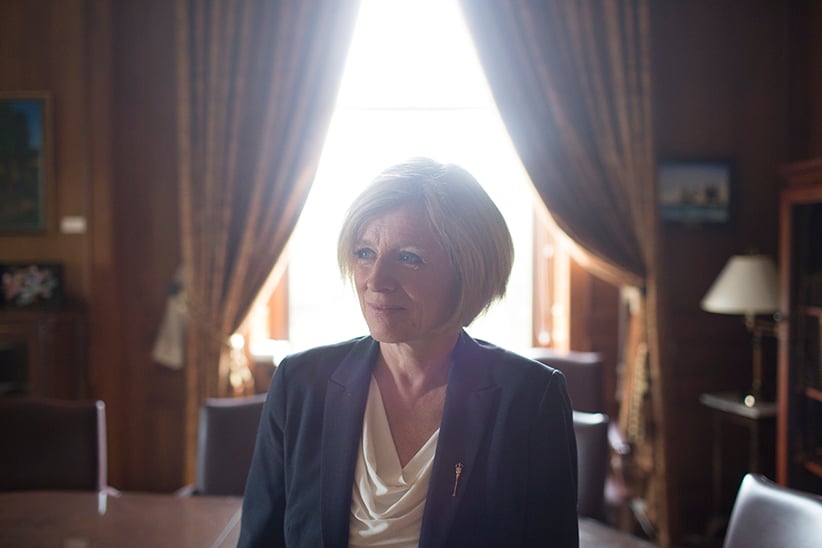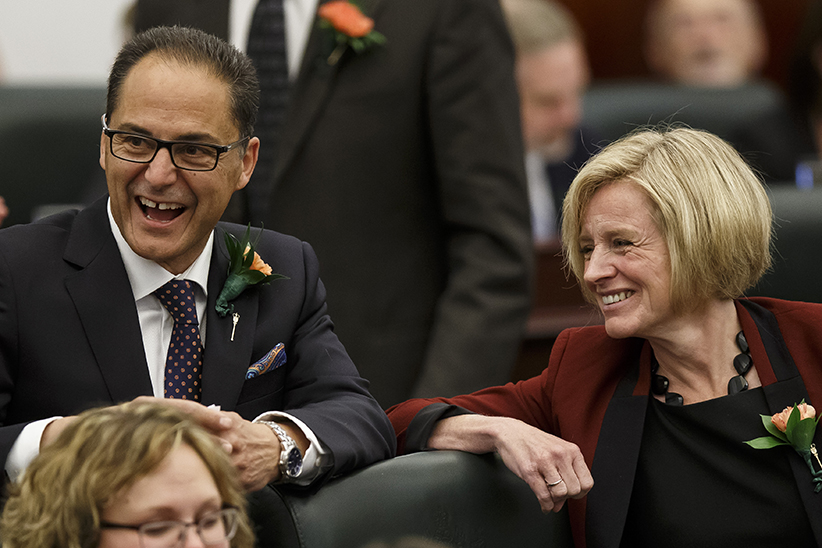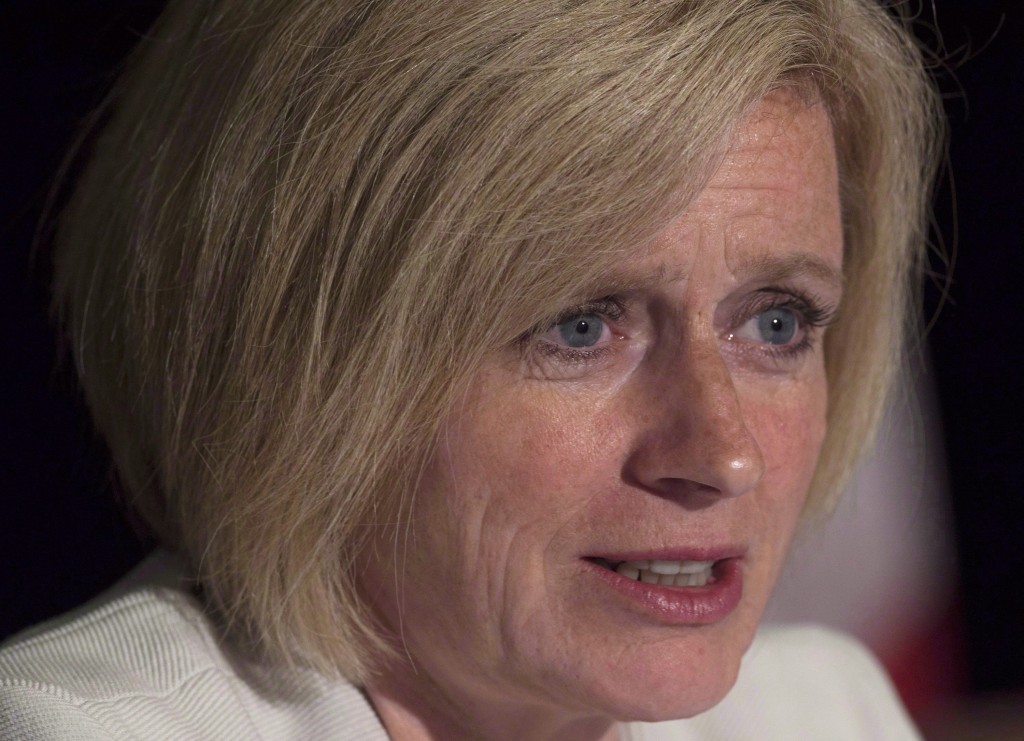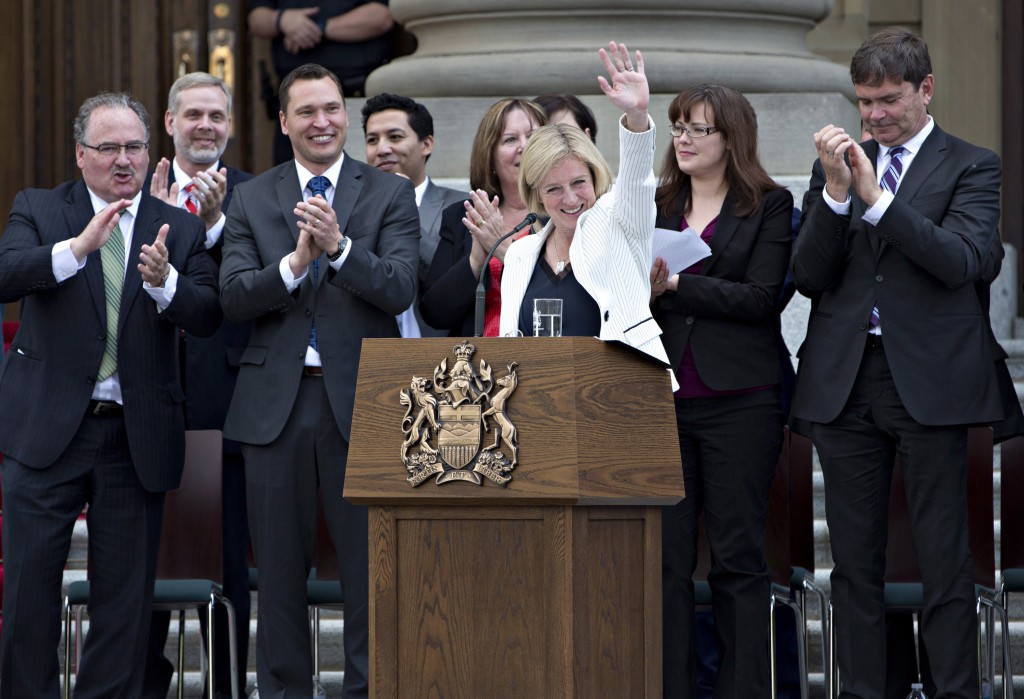The summer’s over for Alberta’s NDP. How about the honeymoon?
Inside Rachel Notley’s surprisingly pragmatic, slightly unprepared, learn-on-the-fly new government
Alberta Premier Rachel Notley pictured in her office in Edmonton Alberta, September 15, 2015. Photograph by Jason Franson
Share

As her black SUV approached the festival gates, Premier Rachel Notley was nervous. The Edmonton Folk Music Festival is her favourite weekend of the year—four largely distraction-free days of music, family and conversations with friends in the beer garden or on low-slung lawn chairs. But events weren’t like they used to be when she was an obscure opposition member, before the stunning NDP victory in May. Everywhere these days, there is a perpetual lineup of people wanting a few words or a selfie.
But on this mellow August weekend on Edmonton’s Gallagher Hill, the smartphone-toting hordes gave her a wide berth and let her have those long friend chats. Her two teenagers volunteered on the festival grounds as normal, and she lined up hours early on Saturday morning, just as she had in years past, to place her tarp close to the main stage.
Her executive assistant phoned her, ready to arrange security guards to pick up the premier. “I said, ‘Oh no, don’t worry about it,’ ” Notley recalls. “ ‘I’m already doing the tarp run. I’m down here right now, lining up.’ And I could hear the intense exchange of emails from far away. It was hilarious.”
As crowds of 25,000 go, the folk fest was safe and comfortable for the new premier. It’s her milieu. If the Calgary Stampede and all its costumed rugged cowboyism was the iconic event of the Progressive Conservative regime, the NDP’s is this midsummer event, where everyone’s polite enough not to bring view-obstructing high lawn chairs, and where the no-oil-sands-pipelines hippies are awash in a sea of save-the-planet-through-sensible-regulation folkies.
Many fellow Edmonton-area NDP members of the Legislative Assembly prioritize folk weekend every summer—and now all Edmonton-area members are NDP. The party annually places a cheeky ad in the festival program: 2012’s had the party’s four MLAs crowded onto a tiny tarp. This year’s spot was a class photo of all 53 NDP members, the surprise politicians from undergraduate campuses, advocacy groups, union shops and public sector retirement.
The same program ad ran for the Calgary Folk Music Festival, whose MLA attendees included Joe Ceci, the festival board’s president, until he took on his new job: Alberta finance minister. Government consulting firms have tried to cozy up to the government MLAs and senior aides by extending invites to the golf tournaments that successfully wooed Conservatives. But these new guys don’t really golf.

But the summer’s now over for the folk-festival party. They’re well aware that outside the festivals’ friendly confines is Alberta’s worst financial mess in a generation. The oil-price air show is mostly tailspins and nosedives, and the industry that’s been Canada’s economic engine—and the province’s cash cow—keeps sputtering. Rounds of layoffs have become cascades. The Progressive Conservatives left the government with a $5-billion deficit; it’s now forecast at $6.5 billion. After unnerving businesses out of the gate early with corporate-tax and minimum-wage hikes, tougher carbon emission rules and a fossil fuels-royalty review, cabinet has spent drought and wildfire season largely quiet, plotting the release of a job creation strategy and a much-delayed budget in late October. Notley will hint at the details with an upcoming speaking tour.
A perennial rump party of the left won in May by attracting support well beyond its folk-festival and union base. Now the golfers, oil executives, restaurateurs, nurses and one of Alberta’s fastest-growing subsections—the unemployed—are watching with straining patience and curiosity to see how (and whether) Alberta’s first NDP government manages.
To help contain a leaky supertanker of red ink, the term “efficiencies” comes up in ministers’ rhetoric almost as often as “invest,” with heavy hints laid for major infrastructure stimulus spending. The NDP government knows that whether they can accomplish a balanced budget before term’s end will be a key determinant of whether they are a Bob Rae-like, one-term blip in Alberta’s conservative history, or whether they become a more durable brand, such as NDP governments in Manitoba and Saskatchewan.
Notley’s top adviser has likened the government’s task to building an airplane while in midair. Based on interviews with several cabinet ministers and with the premier, it’s apparent this surprise government is white-knuckling through plenty of turbulence.
“I would not ever have expected to do what will be forthcoming,” Notley says. “I mean, no one wants to get elected at the time that the price of oil drops below $40 a barrel. It’s not the best time. But you’re dealt the hand you’re dealt with and, so then, you have to take the most thoughtful, responsible way through those challenges.”
Related: How Rachel Notley became Canada’s most surprising political star
Although Notley stated at the spring campaign’s outset that she wanted to be premier—a charmingly implausible idea at the time—nobody expected victory. It wasn’t the groundwork NDPers had laid for the election.
“We identified three or four growth ridings we had put a lot of [energy into]. You know, because we were taking a more incremental approach, to be perfectly honest,” the premier says in her Edmonton office. Over a few elections, after going up to four MLAs, then down to two and back to four again, Notley and her team tried to strip out a lot of traditional NDP platform positions, from throttling the pace of the “tarsands” to introducing public auto insurance. For this first campaign led by Notley, they canned class-size reductions, turned a post-secondary tuition cut into a freeze, added the caveat “as finances permit” to various promises, and a pledge of low-cost regulated electricity became “smart regulation”—a cryptic term that mystifies even the platform authors themselves.
While the NDP had long seemed poised to grow in traditionally progressive Edmonton, Calgary only entered the picture once Notley became leader last fall. She persuaded Ceci—a former social worker and alderman with a gap-toothed and perennial grin—that his values matched those of the party that hadn’t registered on Calgary lefties’ radars since the 1980s. Stephanie McLean, a lawyer who was nominated to run federally in Calgary, recruited two law-school friends to join her on the provincial campaign. They all won: Ceci as guardian of the $50-billion treasury, McLean is deputy whip, and her recruits became ministers of human services and justice.
Justice Minister Kathleen Ganley is also Aboriginal minister, with the heavy task of somehow implementing the UN Declaration on the Rights of Indigenous Peoples, as part of Notley’s unusually tiny 12-person cabinet. “It was important to start with a small group in order to get everybody trained up and singing from the same songbook and focused,” says Notley, salting her speech with a little Mulroney. She and chief of staff Brian Topp—a veteran of former Saskatchewan premier Roy Romanow’s and Jack Layton’s teams—stocked cabinet offices with many recruits from federal and other provincial NDP ranks, many of whom might have otherwise been part of Team Mulcair this fall. Among this Edmonton airlift is a former Manitoba aide in charge of the premier’s office of issues management, a six-person team that keeps tabs on fires to be doused in the ministries at a greater level than Tory premiers did, according to sources.
There are signs of discipline among Notley’s sea of newbie backbenchers, too. She had to turf Calgarian Deborah Drever from caucus before the MLAs were sworn in because of an eclectically vulgar social-media presence, but, since then, Notley hasn’t had an eruption or embarrassment from her rookie crop.
Related: Say hello to Alberta’s new big-money party: The NDP
Brian Mason, the infrastructure and transportation minister, spent much of his 15 years in office as NDP leader, tucked in the legislature corner “looking over at what almost seemed not just a massive government but a permanent one,” he told Maclean’s this summer. “I’m still not used to us being the government and the Tories being the third party. It didn’t seem to me to be the natural order of things.”
Not everything changes when the order does. The sort of Establishment Party rhetoric Mason used to decry became NDP candidate Bob Hawkesworth’s chief argument in a by-election this month: that Calgary–Foothills, which, for four decades, voted Tory, still needed a voice at the government table. In the first test of this young government, voters decided that having 13 of 25 Calgary seats in NDP hands is plenty. In a week fraught with news of recession, layoffs and deficit, the riding went to the Wildrose Party, the right-wing official Opposition party with more than twice as many seats as the Tories.
Notley bid to leverage her own political popularity in the riding, stumping with Hawkesworth several times, but it was for naught. This may not bode ill for the premier’s stockpiled goodwill: Even the Wildrose winner, as much as he slammed the NDP for being bent on “its ideological agenda,” wouldn’t criticize the party’s leader, whom conservatives routinely praise as smart.
Though they dangled power before by-election voters’ eyes, the NDP didn’t wield it for electoral advantage, either. In what was either a signal they were doing things differently or that Calgary–Foothills felt a lost cause—or tick the “both” box—Mason announced transit grants with Calgary’s mayor the day after the by-election, and the government waited until minutes after polls closed on a Thursday night to tell media there would be a morning announcement about protecting a southwest Alberta wilderness area.

Conservationists and supportive locals filled a Crowsnest Pass coffee shop, as Environment Minister Shannon Phillips announced new provincial parks and a ban on mining or logging in the Castle wilderness area. In the news conference, the minister looked ready to clap along with fans at the NDP election promise. “Feels really good to change the government, doesn’t it?” Phillips said.
This former labour policy analyst and NDP aide is one of the government’s most important rookies, in charge of the climate change portfolio. Back at the legislature, she beams that her office was previously the Tory health minister’s. When she has time, she’ll replace his artwork. In the first few question periods in June, she emerged as the New Democrat keenest to throw elbows at the deceased PC regime. On her roller-derby team in Lethbridge, her name is Gnome Stompsky—a riff on U.S. political analyst Noam Chomsky—and she still hopes to practise with them when she’s home.
In June, Phillips announced that a large industrial emitters’ carbon levy will rise from the $15 per tonne it was stuck at since the Ed Stelmach days, to $30 by 2017. The Tories had boasted about this intensity-based charge as proof it was serious on the climate; Phillips says the province must reverse its reputational damage, first with this “interim step,” then a much bolder strategy Notley can bring to global climate talks in Paris in December.
It’s one of several provincial measures the oil patch is closely watching for impact on its ever-bottoming lines. The NDP has appointed separate panels to study changes on oil royalties and climate rules. Two months after launching the first rethink of royalties since 2007, the government pledged to keep current rates intact until 2017, and added revered energy economist Peter Tertzakian to the panel. Notley delivered a speech praising the oil sands during Stampede that some analysts said could be nearly indistinguishable from a Wildrose or Tory lectern-thumper. Still, cynicism abounds.
“Sure, they’re consulting. They ask: Do you want us to punch you in the left eye or the right eye?” says Jack Mintz, an economist with the University of Calgary school of public policy, and a lead naysayer of Alberta’s corporate tax hike.
Wildrose, which built its power base on discontent over the 2007 royalty review, demanded 2015’s be called off. The main oil lobby has instead expressed hopes for an easy landing. May as well proceed with it rather than prolong price uncertainty into the future, Tim McMillan of the Canadian Association for Petroleum Producers told the Calgary Herald.
Phillips was a star at an environmental think tank’s recent climate summit, musing about an early shutdown of Alberta’s coal plants and, later in the day, brandishing poor air-quality reports to predict a new crackdown on vehicle emissions, among other sources that pollute the big prairie skies. Any light touches on energy royalties could be offset by hits through green regulations. Alberta industry and the world beyond Alberta will watch, with divergent reasons, for their eagerness.
Before folk festival season, Alberta’s new NDP leaders revelled with the rest of Calgary at the Stampede—riding horses and vintage cars in the parade, flipping pancakes, and continuing the Tory tradition of Calgary cabinet and caucus meetings—and making good-news announcements for the locals during the trip.
At one media event, Transportation Minister Mason announced Alberta was moving ahead on existing plans for the final leg of Calgary’s ring road. His party had long railed against the PCs building schools and highways by public-private partnership (a.k.a. P3)—“an entirely bogus concept” where profit trumps public, Mason used to say as NDP leader. As minister, he announced it would go ahead as a P3, as the Tories intended. Switching course would set the project back by a year.
“Evidence so far is that the NDP is more likely to change than our culture is,” says Stephen Carter, a key political adviser for former premier Alison Redford and Calgary Mayor Naheed Nenshi. “Brian is allowing a P3 to construct the ring road. It goes completely against every principle he’s spoken about in the legislature, but he did it because he’s pragmatic and he wants to get things done.”
Mason asks nervously when I bring up P3s: “Yeeesssss, what is the question?” A few months in, Mason is humbled by how complicated governing is.
“I would say opposition is uni-directional; you’re going forward to attack the government,” he says. “In government, you operate more spherically; you’re moving in all directions at once. Before you make any move at all, you have to look at it from all angles to make sure it’s the right move.”

The Notley government also had to maintain Tory-era subsidies to energy companies for carbon capture and storage, despite an election pledge to redirect this year’s disbursements to transit. As much as nearly every New Democrat maintains that Albertans elected the party on the strength of its platform—as opposed to, say, finding any warm bodies to replace the cadaverous PCs—they’ve had to admit it’s not all achievable, at least, not as quickly as initially hoped. Anchoring those promises is one for a balanced budget by 2018.
After a quick legislative session and sweep of out-of-the-gate moves—high-income tax hikes, reversing Tory budget trims to health and education, parading out experts to launch various reviews (such as the one on royalites)—the NDP stayed largely quiet this summer, trying to figure out its next moves as oil prices sank further. The Notley era’s first 30 days contained nearly all the activity of the first 100. It’s the next 100 that will really matter. Notley launches a series of speeches on Sept. 28 in Toronto, Montreal and New York, for the public and investors, to preface her economic agenda and, finally, a 2015-16 first budget, which she’ll drop after the federal election. (Notley argues that the delay wasn’t in deference to the federal NDP, but the legislative calendar tied her hands—as though no premier has fiddled with assembly sittings before.)
Related: Rachel Notley’s surprising speech to the Stampede Investor Forum
Ceci, the finance minister, has repeatedly suggested infrastructure stimulus spending to come, which appeared obvious after the NDP commissioned a report from former Bank of Canada governor David Dodge, preacher of the construction-and-buildings gospel in these days of cheap borrowing. This may form part of Notley’s promised jobs plan.
“So the question becomes: What’s the balance of the government’s role and expectation to soften the consequences of the economic downturn and to help Albertans through that tough patch and, on the other hand, the obligation to maintain a responsible hold on its finances?” she says. “Understanding that’s cyclical, too, and you might spend more one year, expecting to be able restrain growth as the private sector picks up.”
It’s a rescue plan reminiscent of Trudeau’s (and so many other politicians’): Latch onto a rebounding business sector and the budget will balance itself. Ceci has also spoken broadly, though vaguely, of new revenue sources atop the party’s early tax increases, and of seeking efficiencies throughout government—something Tory premiers also pursued, to recurring NDP outcry. Shoe, meet other foot.
“If there are opportunities to use the [same] dollar to achieve the same outcomes, or even better outcomes, that’s something you need to be exploring,” Health Minister Sarah Hoffman says in an interview. The NDP insists it will maintain social services, yet it could wind up enacting some of the same health austerity measures it proudly reversed from Prentice’s failed spring budget (though the Alberta hospitals agency had said it could absorb that shortfall without layoffs). Labour groups had warned of doom: “Cuts mean pain and maybe even death,” one health workers’ leader said. Will they hold back such dire tones against a labour-party government?

Public Interest Alberta, the union-funded advocacy group, lost its executive director to the health minister’s office. Joel French, a former Mason aide, has filled in, and can’t point to shortcomings with the governing party’s platform. “We do want to help create the political space where the public is on board with [the NDP agenda],” says French, who also works with labour-backed Friends of Medicare. His association discussed disbanding once the NDP won power, but leaders acknowledged that groups such as the Fraser Institute and the Canadian Taxpayers Federation didn’t stop chirping at Alberta when the Conservatives ruled.
Public sector union contracts also begin expiring next year, possibly setting up another case of only Nixon going to China. “To some extent, it actually puts me in a better position, because I understand how functional, well-informed bargaining can look like,” says Notley, a former labour lawyer and negotiator.
If she has good survival instincts, the premier won’t worry about satisfying unions, says Faron Ellis, a political scientist at Lethbridge College. “The new NDP voters outnumber that base, and not all of the base is hard-core social radical, so certainly, the majority within her current political support would be advocating for a moderate centrist government,” he says.
Ellis was going to run as a Wildrose candidate, but dropped out last year as the leader led a mass floor-crossing to the Tories—a move that left the NDP as the sole opposition party with any momentum against the PCs. He says Notley offered a “Ralph Klein-style of populism” to an Alberta that’s not nearly as conservative as myth maintains; his social-issues surveys have shown a populace evolving in lockstep with the rest of Canada, and people like government services. “Spending more money on government programs is nothing we’ve ever been shy about in Alberta,” he says.
Ceci must juggle pressures to fulfill those NDP desires and contain the deficit. “People were telling me about the demeanour of finance ministers, how you have to interact. And that’s,” he pauses uneasily, “say ‘no.’ ” Dodge, deputy finance minister during Paul Martin’s 1990s deficit-slashing, came to visit Ceci in July. He reads his notes from that meeting, in green ink: “You have to be the disciplinarian. You’re the president of the treasury and the finance minister. You have to have a really tight grip on the allocation process . . . I have to say ‘no.’ ”
The finance minister, like many colleagues, still basks in memories of that bright Sunday in May on the legislature’s steps, when the government was sworn in. Thousands gathered, kids enjoyed popsicles and splashing in the fountain, an acoustic group played O Canada, and all ministers had to worry about was runs in their stockings or their signatures’ legibility in the official register.
Yeah, it resembled a folk festival, government as headlining act. Four months on, a broader crowd is still wondering what they’ll hear next.